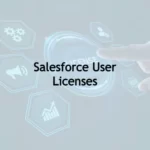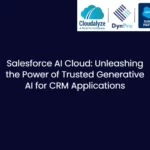Understanding Salesforce Licenses and Editions: A Comprehensive Guide
Salesforce licenses and editions play a crucial role in the Salesforce platform, offering distinct characteristics that impact user access and feature availability. It’s essential to understand the differences between licenses and editions to effectively manage user access within your Salesforce org.
In this comprehensive guide, we will provide an in-depth explanation of Salesforce licenses and editions, highlighting their distinctions and emphasizing their importance. By the end, you’ll have a solid understanding of these concepts, empowering you to optimize your Salesforce usage and maximize the benefits for your organization.
A. Salesforce Editions:
Salesforce editions are essential for determining the level of access and functionality available to your organization. Upgrading to higher editions unlocks advanced capabilities and expanded features. Popular editions like Professional, Enterprise, and Unlimited offer varying levels of functionality to suit specific business needs.
B. Salesforce Licenses: Granting User Access
Salesforce licenses grant individual users access to Salesforce products and features within your company. These licenses are assigned on a one-to-one basis, defining users’ baseline access level. Customization options such as profiles, permission sets, and the role hierarchy allow for further refinement of user access.
Salesforce User Licenses and Salesforce Feature Licenses: Understanding the Difference
It’s essential to differentiate between Salesforce User Licenses and Feature Licenses when managing user access. These licenses serve different purposes and determine user access levels.
A. Salesforce User Licenses: Salesforce User Licenses define the baseline features and functionality available to users. Examples include Salesforce, Identity, and Platform Starter licenses.
B. Salesforce Feature Licenses: Salesforce Feature Licenses provide additional access to features not included in the User License or base edition. Examples include Marketing User, Flow User, Knowledge User, and Service Cloud User licenses.
The Relationship between User Licenses and Feature Licenses
The relationship between User Licenses and Feature Licenses is crucial for optimizing user access.
A. Company decides to purchase Salesforce: When an organization decides to invest in Salesforce, they choose an edition that aligns with their needs, determining the core features available.
B. Purchase licenses and Choose an edition: The organization acquires User Licenses, granting access to Salesforce based on the chosen edition, with each user typically receiving one User License.
C. Assign User Licenses and Feature Licenses: The organization assigns User Licenses to users, defining their baseline access. Optionally, Feature Licenses can be assigned, providing additional features not included with the User License.
Salesforce Platform Licenses and Associated Features
Salesforce Platform Licenses, available in the Enterprise and Unlimited editions, provide access to a range of features and tools. These licenses come in two variations: Platform Starter and Platform Plus.
A. Platform Starter: Grants users access to 10 custom objects, enabling limited customization of their Salesforce instance.
B. Platform Plus: Offers users access to 110 custom objects, providing a more extensive level of customization and flexibility.
Salesforce Identity Licenses:
Enable users to log in via Salesforce single sign-on (SSO) without requiring a full CRM license. For instance, Pardot (Account Engagement) enforces SSO for Pardot accounts, requiring users to sign in through Salesforce. Users without a Salesforce license can be assigned an identity license, enabling Pardot-only users to access the Pardot Lightning app via Salesforce login.
Salesforce Einstein Licenses:
Salesforce introduced Salesforce Einstein in 2016, marking its entry into the exciting realm of artificial intelligence (AI). Unlike a standalone product, Salesforce Einstein operates as an integrated technology layer within the Salesforce Lightning platform and various Salesforce Cloud offerings.
Einstein Features:
- Some features, such as Einstein Search and Opportunity Scoring, come pre-enabled with Salesforce Enterprise edition and above.
- The majority of Einstein features are accessible in the Salesforce Unlimited edition.
- Certain Einstein features require an additional cost on top of Salesforce Enterprise and Performance editions.
Additionally, Salesforce offers tailored Einstein bundles for different Cloud products, including Sales Cloud Einstein, Service Cloud Einstein, and Marketing Cloud Einstein. These bundles package together an array of AI-driven functionalities designed to cater to specific use cases.
Freemium Einstein Features: Salesforce also offers freemium Einstein features, albeit with certain limitations and conditions:
- Einstein Next Best Action (NBA): Available with 5,000 requests per month for Essentials edition and above, with the option to purchase additional request blocks of 10K.
- Einstein Prediction Builder: Allows one active prediction at a time for Enterprise edition and above.
- Einstein Discovery: Accessible with B2B Marketing Analytics Plus.
Salesforce Experience Cloud (Community) Licenses:
Salesforce Experience Cloud, also known as Community Cloud, provides external users such as customers and partners with access to your Salesforce organization through a portal or community. There are five license types available for Experience Cloud:
- External App
- Customer Community
- Customer Community Plus
- Partner Community
- Channel licenses
Marketing Cloud Licenses:
Over the years, Marketing Cloud acquisitions have resulted in the creation of five bundles to cater to different organizational needs. Each bundle is further divided into editions, following a per org billing model.
One of the significant bundles is Marketing Messaging & Automation, encompassing essential features found in any marketing automation platform. This bundle offers four editions: Basic, Pro, Corporate, and Enterprise. The pricing for licenses within this bundle starts at $400/org/month, with higher-tier editions reaching four-figure amounts that may not be explicitly listed on the website.
Navigating Marketing Cloud pricing requires careful consideration of the specific modules and editions relevant to your organization’s requirements. It is advisable to consult with Salesforce or a qualified partner to obtain accurate pricing information and tailor a solution that meets your marketing automation needs.
Pardot Licenses (Account Engagement):
Pardot follows a per-organization billing model. With a single Pardot license, you can provide access to as many users within your organization as needed. B2B Marketing Analytics licenses and identity licenses are exceptions to this model.
Salesforce Pardot licenses are essential for marketing automation, offering powerful features to businesses. With Pardot, organizations can streamline marketing, generate leads, and nurture customer relationships. These licenses provide functionalities like email marketing, personalized landing pages, lead nurturing automation, and detailed analytics. Pardot offers different license types, including Pardot Plus, Advanced, and Premium, each with varying capabilities. Pardot Plus is ideal for essential automation, while Advanced offers advanced segmentation and A/B testing. Premium includes advanced analytics and customizable user roles. Pricing is typically per user, allowing scalability. Pardot licenses empower businesses to automate marketing and drive results.
Understanding Salesforce licenses and editions is fundamental to maximizing your Salesforce experience. By optimizing user access and customizing feature availability, organizations can leverage Salesforce to meet their specific business requirements.
For more detailed information and updates on Salesforce licenses and editions, please refer to the official Salesforce documentation.




